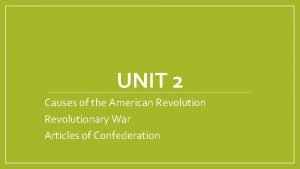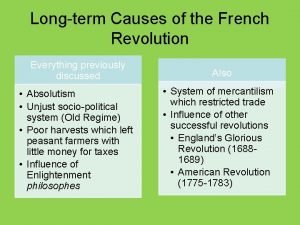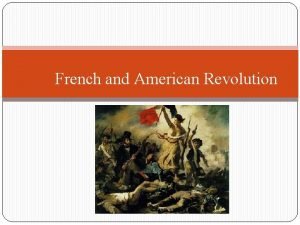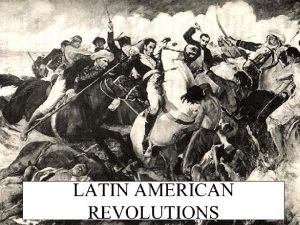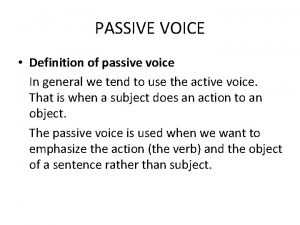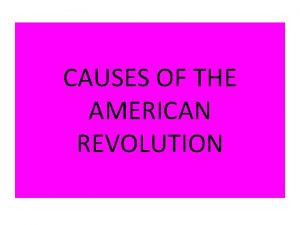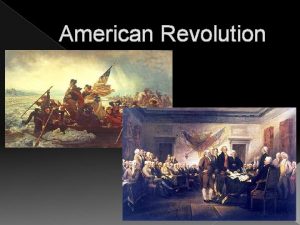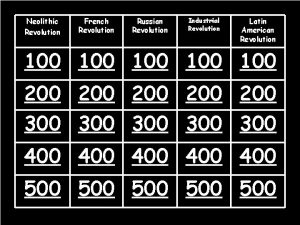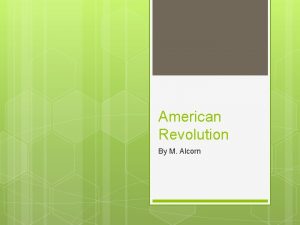Causes of the American Revolution The student understands













- Slides: 13

Causes of the American Revolution The student understands significant economic and political issues of the revolutionary era. (A) analyze the causes of the American Revolution including the Proclamation of 1763, the Intolerable Acts the Stamp Act, mercantilism, lack of representation in Parliament, and British economic policies following the French and Indian War

Britain, France, the Fur Trade, and the Ohio River Valley By the mid 1700 s, Great Britain had expanded their fur trade to the west and began to claim land just west of the Appalachian Mountains. The French built forts along the Great Lakes to protect their claim on North America Both Nations claimed the Ohio River Valley as their own. In 1754 France and Britain went to war over control of the territory. Native American tribes sided with the French, the conflict was named the French and Indian War.

Impact of the French and Indian War The major effect of the French and Indian War was that France lost their claim on North America. Great Britain gained land that was once apart of New France. In addition, they were left with a huge debt from fighting the war. The lands gained by Britain were not empty, the Native Americans who occupied the lands were hostile towards British settlers. In the summer of 1763, Native Americans led by their chief, Pontiac, began to raid and destroy nearly every fort west of the Appalachian Mountains. This came to be know as Pontiac’s Rebellion

The Proclamation of 1763 Pontiac’s Rebellion showed King George III that defending British colonist form Indian attacks in western lands would be costly. The king issued a Royal Proclamation in the fall of 1763. It stated that lands west of the Appalachian were off limits. They were not be settled by British colonist, they were to be reserved for Native American use. The Proclamation angered colonist who felt they had won the right to settle those lands. Political power in America depended on land ownership, many colonist hoped to find land for themselves and for their children west of the Appalachian Mountains.

Complete the following: Events Impact/Effect French and Indian War • Britain removed France from North America • Britain gained more territory in North America • Britain also was left with a huge debt from fighting the war Proclamation of 1763

A closer look at Mercantilism and It’s role in the American Revolution According theory of Mercantilism European nations must own and control colonies in order to gain wealth and power. Colonies existed for the sole purpose of serving the mother country. England enforced Mercantilism through a series of laws to ensure they could profit from colonial trade and to make the colonies dependent on British manufactured goods. Navigation Acts – were a series of laws passed to enforce Mercantilism by restricting colonial trade according to these rules: • goods could only be shipped into and out of the colonies using British ships, • certain goods could only be sold to England no one else, • colonist were not allowed to compete with British manufacturers, • colonist were not allowed to purchase goods directly from other nations.

The Rights of Englishmen, Taxes, and Representation in Parliament Colonist viewed themselves as Englishmen. They felt they had all the rights listed on the right. British colonist were accustomed to certain rights and liberties that had long been established in England. Among these rights included: Taxation by consent only: When King John signed the Magna Carta in 1215, he agreed that taxes could only be collected with the consent of the taxpayer. Parliament: England’s law making body, gained supremacy over the British King in the 1600 s, all new taxes had to be approved by Parliament before they could take effect. Representation – Englishmen enjoyed the right to be represented in Parliament and to have their voice heard.

Taxation without Representation The phrase, “Taxation without representation is tyranny!” was used throughout the colonies to protest Parliament’s actions. Parliament had, for the most part, left the colonies alone through out the Colonial era. Colonist were accustomed to governing themselves and having to pay taxes directly to their colonial assemblies. After the French and Indian War, Great Britain found itself in big trouble. First off, the war had been costly and left England with a huge debt to repay. Secondly, the cost of defending the colonies from Indian attacks also proved to be costly. These two factors forced Parliament to act in an unusual manner. Parliament passed a series of taxes directed towards the colonist and designed to force colonist to pay their fair share of British expenses. Parliament passed these taxes without colonial representation nor consent. Colonist felt this was a clear violation of there rights as

“Salutary Neglect”, is a term used to describe the lax enforcement of mercantile law during the Colonial Era. Britain’s mercantilist policies were designed to make mother England wealthy from it trade and control of her American colonial economy. However, during the development of the 13 Colonies, England did very little to enforce the laws of mercantilism. The thinking was if the colonial economy was allowed to develop freely, then more profits could end up in the Crown’s Treasury. So this meant, often, that laws were passed to regulate colonial trade, but were rarely enforced. As a result colonist became accustomed to acting independently. After the French and Indian War Britain began to enforce mercantile laws more tightly. After decades of neglect, colonist were infuriated by British economic polices such as the Stamp Act, Sugar Act, Townshend Act, Quartering Act, and especially the Tea Act. Not only were these laws passed with out colonial representation in Parliament, they were passed with out the consent of the colonial legislatures. These laws were met with violence and protest. Colonist fought hard to have these laws, which they felt violated their rights as Englishmen, repealed. Salutary Neglect in addition to the British economic policies following the French and Indian War helped to cause the American Revolution.

Following the French and Indian War, Britain implemented a series of taxes designed to raise money to pay the debt incurred because of the War. Each of these Acts were passed in Parliament without colonial consent nor representation. Below is description of each tax along with the colonist reaction to these new taxes. British Acts What it said How colonist reacted SUGAR ACT 1764 It reduced the tax on imported sugar but led to stricter enforcement of the law. Colonist organized protest and the Act was repealed. STAMP ACT 1765 A new type of tax designed to raise money to pay the debt form the French and Indian War. It required all printed documents to carry a stamp to show the tax had been paid. Colonist organized under the Stamp Act Congress , held boycotts of British goods, attacked tax collectors, and petitioned the King, the Stamp Act was repealed. QUARTERING ACT 1765 A cost saving measure that required colonist to house (provide room and board) British soldiers. Colonist refused to house soldiers, their colonial assemblies were canceled as a result. TOWNSHEN ACT 1767 A different way of collecting taxes from the colonies by Imposed duties on goods imported into the colonies Colonist protested this act. TEA ACT 1773 Required that all tea sold in the colonies to be done by the British The Boston t Tea Party Colonist dressed as Mohawk

The Stamp Act 1765 The Stamp Act was passed by Parliament in 1765. This was a new kind of tax, according the law, all printed document must be stamped to show that the tax had been paid. Newspapers, legal documents, licenses, even playing cards were taxed. pay the cost of defending the frontier and The money collected was help stationing 10, 000 troops in thetocolonies. Colonist were not upset by the cost of the tax, which was 1 penny, but rather at the standard it set. The goal of the tax was to raise revenue. This was a new use for tax money. The tax itself had been passed with out the consent of colonial legislatures. Colonist held the belief that Englishmen could only be taxed with the approval of their colonial legislatures. Many colonist felt Parliament had overstep their authority. Colonist organized boycotts of British goods, staged protest, petitioned the King, some colonist even attacked tax collectors. Patrick Henry, a member Virginia House of Burgesses, was able to convince the assembly to pass resolutions against the tax. The efforts of the colonist

Intolerable Acts/ a. k. a the Coercive Acts In 1773, because of colonial protest, Parliament canceled all new taxes except the tax on tea. The Tea Act required that colonist purchase their tea only from the British East Indian Company. In response to the Act, members of the Sons of Liberty, a secret organization created to oppose British tax policies, dressed as Mohawk Indians and dumped the shipment of tea into Boston Harbor. The Boston Tea Party is one of the most well know of colonial protest during the revolutionary era. Parliament reacted strongly to the Boston Tea Party. In 1774, Parliament passed the Coercive Acts, otherwise known in the colonies as the Intolerable Acts, a series of laws designed to punish the citizens of Boston for their part in the Tea Party. Colonist from through out the 13 Colonies rallied to support their fellow colonist in Boston. The passing of the Intolerable Acts marked a key point on the road to the revolution.

Example of how to fill in your table. Cause of the American Revolution Description of the Cause Explanation of how or why this caused the American Revolution Proclamation of 1763 A law that stated colonist could not settle in lands west of the Appalachian Mountains. They were to be reserved for Native Americans. Colonist began to resent the British government because of this law. Many colonist were hoping to claim land for themselves and their families in the Ohio River Valley. They felt they won the right to settle those lands.
 Main causes of the american revolution
Main causes of the american revolution American revolution strengths and weaknesses
American revolution strengths and weaknesses Long term causes french revolution
Long term causes french revolution Causes of american revolution
Causes of american revolution Causes of the american revolution gallery walk
Causes of the american revolution gallery walk Causes of latin american revolution
Causes of latin american revolution Could the french revolution have been avoided
Could the french revolution have been avoided She would reject the offer passive voice
She would reject the offer passive voice God understands our pain
God understands our pain How to respond to instructions
How to respond to instructions Proximate causation biology example
Proximate causation biology example Polygyny in animals
Polygyny in animals Seasons
Seasons Causes and effects of the russian revolution
Causes and effects of the russian revolution
